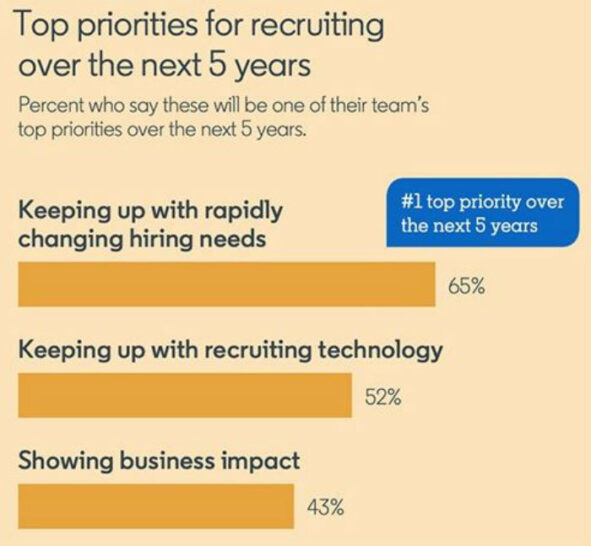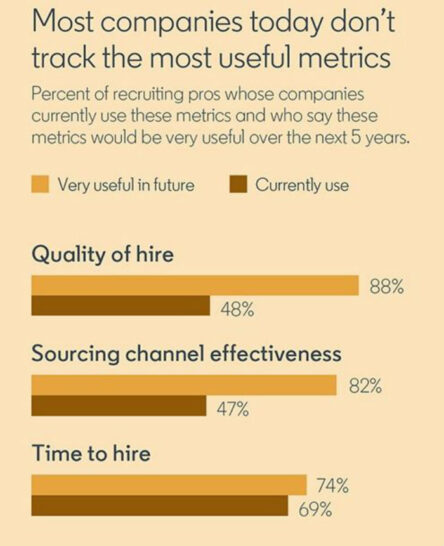7 ways finding a job is changing – and what it means for you

If you’re ever looking to switch companies in the field you work in or want an entirely new career path, you might want to think about turning to a staffing agency. Staffing agencies have recruiters whose main role is finding you a job.
Sometimes you don’t even have to go searching. Recruiters will look over resumes and reach out to qualified candidates to see if you’re interested in an open position. They’re very helpful when it comes to job hunting.
However, LinkedIn says the future of recruiting will change drastically. Even if you’re not a recruiter, but own your own business or are in the market for a new job, these are things you should be aware of. Visit LinkedIn.com/Kim and get $50 off your first job post.
Here are seven predictions on how recruiting will be different in the next five years.
1. The role of recruiter will be more important than it is now
According to LinkedIn, recruiters have become the recruited as demand for recruiting professionals has jumped by 63% since 2016. That trend is expected to continue.
That’s because talent will matter more. As automation takes over the most repetitive tasks, work left to humans will be more creative, less predictable and more consequential to businesses overall.
Since the market for recruiting professionals is getting more competitive, now may be a good time to be proactive. Capacity planning can help you figure out how many recruiters you’ll need ahead of time.
Failing to plan ahead can be costly. Companies that wait until they’re in urgent need of in-demand talent are more likely to pay more and be forced to lower their standards.
2. Get used to changing hiring plans
Most companies have hiring goals that change over time, but the pace of those changes has been speeding up lately. LinkedIn questioned thousands of talent acquisition pros about their top priorities from now until 2024. The top answer was keeping up with rapidly changing hiring needs.
As business models, markets and goals change, recruiting teams will need to be able to pivot quickly.
One way to stay agile is by making sure recruiters are comfortable bringing in all types of talent. Instead of only hiring within one business line, try to mix things up and hone your general recruiting skills.
3. Recruiters will bring more business strategy
Many recruiting jobs still revolve around things like sourcing, interviewing or closing candidates. It’s one thing to execute a hiring plan, it’s quite another to design one — and in the future, companies will ask recruiters to do both.
Strategic thinking, problem-solving and general business acumen will be as important as knowing the ins and outs of recruiting. In this more strategic role, leaders and rank-and-file recruiters will be the ones telling business when they need a new hire, rather than the other way around.
4. It’ll be easy to track recruiting activity, but you’ll care more about calculating business impact
LinkedIn’s survey found that time-to-hire is the most commonly tracked hiring metric. But as it becomes easier to automatically log action-based metrics, your attention will turn to measure business outcomes.
Once you have a system that automatically calculates stats like time-to-hire for you, you’ll be able to spend more time calculating more strategic, impactful metrics. Most talent acquisition pros agree the quality of hire is most important. Business leaders will soon expect recruiters to have these kinds of metrics at the ready.
5. Better tools and tech will be key to boosting your recruiting team’s performance
LinkedIn’s survey found that investing in better recruiting tools and technology is the best way to improve recruiting professionals’ performances. The tech won’t replace recruiters, but it will reduce busywork and save time.
One example would be video interviews. This is where candidates submit a video of their answers and could reduce a three-week screening process to about 48 hours.
6. Engaging passive talent, analyzing talent data and advising business leaders will be key skills for recruiters
These skills are already valuable today, but they will become invaluable in the next five years. Over 80% of talent acquisition pros told LinkedIn these skills are all growing importance for recruiters.
Platforms like LinkedIn have made it far easier to identify amazing candidates. But with so many other recruiters going after that same talent, the real challenge will be standing out from the crowd and truly connecting with candidates. That’s where storytelling and personalizing your approach can make a big difference.
Rather than simply entering data correctly, recruiters will also need to leverage data-driven insights to drive decisions. And instead of executing orders, recruiters will also need to advise business leaders and hiring managers — that means pushing back and setting the strategy, not just following it.
7. Your recruiting team will probably have more non-recruiting specialists
Many companies are enhancing their recruiting teams by adding specialists dedicated to talent analytics, recruitment marketing and recruitment tech. According to LinkedIn’s survey, those were the three most important roles, and they still aren’t very common — but by 2024, there’s expected to be many more.
Since these roles have rarely existed within recruiting, you’ll have to be flexible when integrating them into your team. Once you learn how they can best contribute, you’ll find these new roles will add a new depth of expertise while allowing recruiters to focus on what they do best.
In conclusion
Businesses will need recruiters more and recruiters will be called on to do more.
Some examples include the ability to engage passive candidates inundated by offers, analyze talent data and advise leaders, tease out long-term business results and forecast future hiring needs, master new technologies and build new types of teams.
What matters most now is getting ready. Preparing today will leave you better equipped for whatever the future holds.
Visit LinkedIn.com/Kim and get $50 off your first job post.
Tags: automation, future, job hunting, LinkedIn, matter, predictions, tech, technology, video


